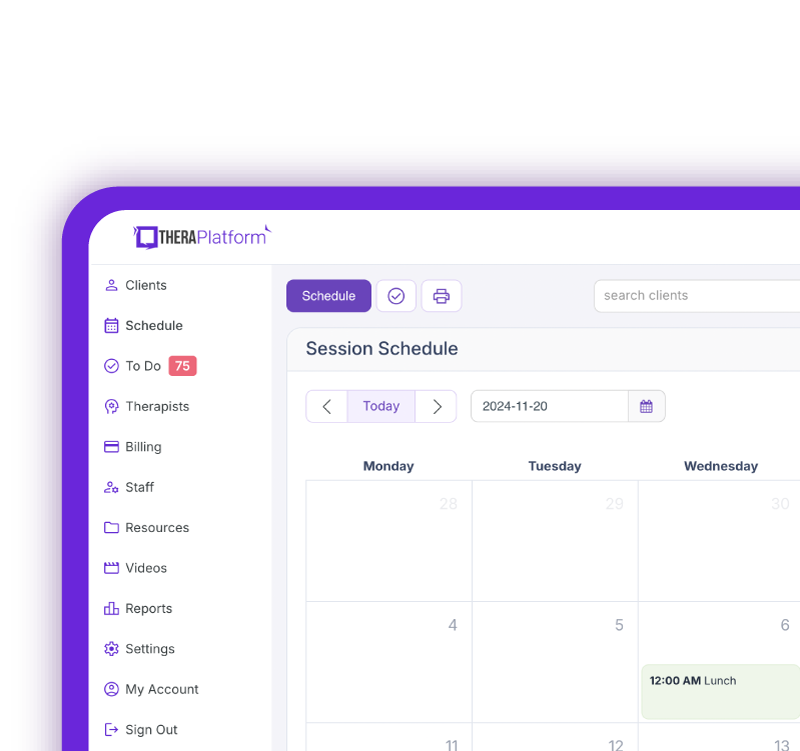CPT code 97129

97129 CPT code is a billing code for therapeutic interventions focusing on cognitive functions, such as attention, memory, executive function, and problem-solving.
Summary
- CPT Code 97129 is used for therapeutic interventions targeting cognitive functions and covers structured, individualized therapy to help patients regain functional independence.
- The 97129 CPT code is time-based, covering the first 15 minutes of therapy, with additional time billed under CPT code 97130 for each 15-minute increment. It applies to a wide range of cognitive impairments. Enrolling in an insurance billing course for therapists can help providers enhance their knowledge.
- Accurate documentation is essential for proper billing and reimbursement. Therapists should track progress, include comprehensive treatment plans, and follow coding guidelines to ensure medical necessity and successful claim submission. By leveraging an EHR like TheraPlatform for efficient documentation and claim submission, therapists can tackle billing with ease.
→ Click here to enroll in our free on-demand Insurance Billing for Therapists video course [Enroll Now]
It also focused on pragmatic functioning and strategies for managing activity performance, such as managing schedules or initiating, organizing, and following up on tasks. The code is designed to support clients with cognitive deficits through structured activities that enhance their functional independence.
Key components of the 97129 CPT code
The 97129 CPT code is time-based and covers the first 15 minutes of service. If therapists require additional time beyond the initial session, CPT code 97130 is used to bill for each additional 15-minute increment. It encompasses direct, one-on-one therapeutic interventions that target and address specific cognitive skills.
The interventions provided under the 97129 CPT code are highly individualized, addressing each client's unique cognitive impairments to improve independence and overall quality of life. Therapy sessions may focus on cognitive domains, including following multi-step directions, memory recall, attention and concentration, problem-solving, task sequencing, organizational skills, and executive functioning skills.
Watch this video to learn common insurance billing struggles and solutions
→ Start My Free Trial
→ Start My Free Trial
How to use the 97129 CPT code
Healthcare professionals such as occupational and speech therapists, psychologists, neuropsychologists, licensed professional counselors, and/or social workers will utilize CPT code 97129 to provide cognitive rehabilitation for individuals experiencing conditions that impact their cognitive functioning.
These conditions may include but are not limited to:
- Traumatic brain injuries (TBIs)
- Cerebral vascular accidents (stroke)
- Dementia
- Mild cognitive impairments
- Developmental delays
- Mental health conditions that impact cognition, such as depression, anxiety, or schizophrenia that affect cognitive processes like attention, memory, recall, and executive functioning.
Therapists use the 97129 CPT code in outpatient rehabilitation centers, schools and educational systems, community-related programs, and home-based therapy. The flexibility of environments allows for tailored interventions that meet patients where they are, ensuring continuity of care across different environments.
For the pediatric population, improving cognitive skills related to social interactions, academic success, and functional activity of daily living skills may be the focus.
Adult and geriatric populations may receive therapeutic intervention methods focused on restoring cognitive function for work-related tasks, managing daily household roles or routines, or maintaining independence in self-care activities.
Overall, the primary goal of the 97129 CPT code is for patients to enhance their cognitive functioning and various aspects of cognitive functioning, such as executive functioning, memory recall, task sequencing, and problem-solving skills, and develop strategies for improved organization and planning to increase their overall independence in daily living tasks.
Cognitive rehabilitation services are vital for helping patients regain lost functional skills and adapt to cognitive changes and challenges in everyday life.
Billing tips for the 92129 CPT code
Ensuring accurate documentation for the 97129 CPT code is essential for proper billing, reimbursement, and continuity of care. Thorough and precise documentation helps justify the medical necessity of cognitive therapy services, supporting both short-term interventions and long-term treatment plans.
Documentation should include comprehensive patient information, a detailed medical and therapeutic history, initial and ongoing evaluations, clinical decision-making processes, and a clearly defined, individualized treatment plan.
A well-structured treatment plan should outline specific cognitive deficits, therapy goals utilizing the SMART approach, intervention strategies, and measurable outcomes.
Detailed notes should capture the areas targeted in each session, the activities performed, the patient's response to therapy, and any observed progress or challenges. Therapists and other healthcare providers should document changes in cognitive function over time, including improvements in executive functioning, memory, attention, problem-solving, and task sequencing.
Additionally, therapy notes should reflect modifications to the intervention plan based on patient performance and feedback, ensuring a personalized and dynamic approach to treatment.
When therapy extends beyond the initial 15 minutes of a session, CPT code 97130 is used to bill for each additional 15-minute increment of cognitive services. This allows for proper billing for extended therapy sessions, prevents claim denials, and ensures compliance with billing regulations.
Therapists should understand proper coding guidelines and maintain accurate time tracking for each session. They should also understand insurance payer policies. Healthcare professionals should verify coverage with specific insurance plans, as reimbursement can vary, ensure pre-authorization if necessary, and maintain thorough documentation to support medical necessity.
Furthermore, collaboration with patients, caregivers, and interdisciplinary teams can strengthen documentation efforts.
Incorporating caregiver observations, functional outcome measures, and standardized assessments can provide additional support for medical necessity. This holistic approach enhances patient care and ensures that therapy services remain accessible and financially sustainable for both the healthcare provider and the client.
Practice Management + EHR + Telehealth
Manage more in less time in your practice with TheraPlatform

Best practices for using the 97129 CPT code
Cognitive therapy therapists must employ evidence-based practices and techniques to enhance daily functional skills.
These include:
- Cognitive retraining
- Compensatory strategies (e.g., memory aids, planners, calendars, and reminders)
- Task-specific training
Integrating therapy activities with real-life tasks improves treatment efficacy and reinforces the medical necessity of services.
For example, teaching a multi-step cooking task can strengthen sequencing, attention, memory, and safety. Additionally, incorporating workplace-related activities such as time management, organization, social interactions, decision-making, and the cognitive aspects of communication can further enhance various areas of cognitive functioning, promoting greater independence and success in daily life.
Regular progress monitoring through standardized assessments, detailed progress notes, and feedback from patients and caregivers are essential to support the need for ongoing therapy services. Therapists can effectively support their clients' cognitive rehabilitation process by following essential billing guidelines and best practices.
The 97129 CPT code is essential for addressing cognitive impairments that affect daily functional skills. Through structured and evidence-based interventions, therapists and healthcare professionals can help patients regain independence and enhance their overall quality of life.
To maximize the effectiveness of CPT code 97129 and to ensure optimal outcomes, therapists should adhere to billing guidelines, maintain thorough documentation, apply research-based intervention strategies, and stay informed on payer policies to secure proper reimbursement.
By following these best practices, therapists can support cognitive rehabilitation while ensuring compliance with billing regulations, ultimately promoting improved patient outcomes and greater functional independence.
Practice Management + EHR + Telehealth
Manage more in less time in your practice with TheraPlatform

How EHR and practice management software can save you time with insurance billing for therapists
EHRs with integrated billing software and clearing houses, such as TheraPlatform, offer therapists significant advantages in creating an efficient insurance billing process. The key is minimizing the amount of time dedicated to developing, sending, and tracking medical claims through features such as automation and batching.
What are automation and batching?
- Automation refers to setting up software to perform tasks with limited human interaction.
- Batching or performing administrative tasks in blocks of time at once allows you to perform a task from a single entry point with less clicking.
Which billing and medical claim tasks can be automated and batched through billing software?
- Invoices: Create multiple invoices for multiple clients with a click or two of a button or set up auto-invoice creation, and the software will automatically create invoices for you at the preferred time. You can even have the system automatically send invoices to your clients.
- Credit card processing: Charge multiple clients with a click of a button or set up auto credit card billing, and the billing software will automatically charge the card (easier than swiping!)
- Email payment reminders: Never manually send another reminder email for payment again, or skip this altogether by enabling auto credit card charges.
- Automated claim creation and submission: Batch multiple claims with one button click or turn auto claim creation and submission on.
- Live claim validation: The system reviews each claim to catch any human errors before submission, saving you time and reducing rejected claims.
- Automated payment posting: Streamline posting procedures for paid medical claims with ERA. When insurance offers ERA, all their payments will post automatically on TheraPlatform's EHR.
- Tracking: Track payment and profits, including aging invoices, overdue invoices, transactions, billed services, service providers.
Utilizing billing software integrated with an EHR and practice management software can make storing and sharing billing and insurance easy and save providers time when it comes to insurance billing for therapists.
Streamline your practice with One EHR
- Scheduling
- Flexible notes
- Template library
- Billing & payments
- Insurance claims
- Client portal
- Telehealth
- E-fax

Resources
TheraPlatform is an all-in-one EHR, practice management, and teletherapy software built for therapists to help them save time on admin tasks. It offers a 30-day risk-free trial with no credit card required and supports different industries and sizes of practices, including occupational therapists in group and solo practices.
More resources
- Therapy resources and worksheets
- Therapy private practice courses
- Ultimate teletherapy ebook
- The Ultimate Insurance Billing Guide for Therapists
- The Ultimate Guide to Starting a Private Therapy Practice
- Mental health credentialing
- Insurance billing 101
- Practice management tools
- Behavioral Health tools
Free video classes
- Free on-demand insurance billing for therapist course
- Free mini video lessons to enhance your private practice
- 9 Admin tasks to automate in your private practice
References
Coding and Payment of Cognitive Evaluation and Treatment Services: Considerations for SLPS. American Speech-Language-Hearing Association.
https://www.asha.org/practice/reimbursement/coding-and-reimbursement-of-cognitive-ev aluation-and-treatment-services



